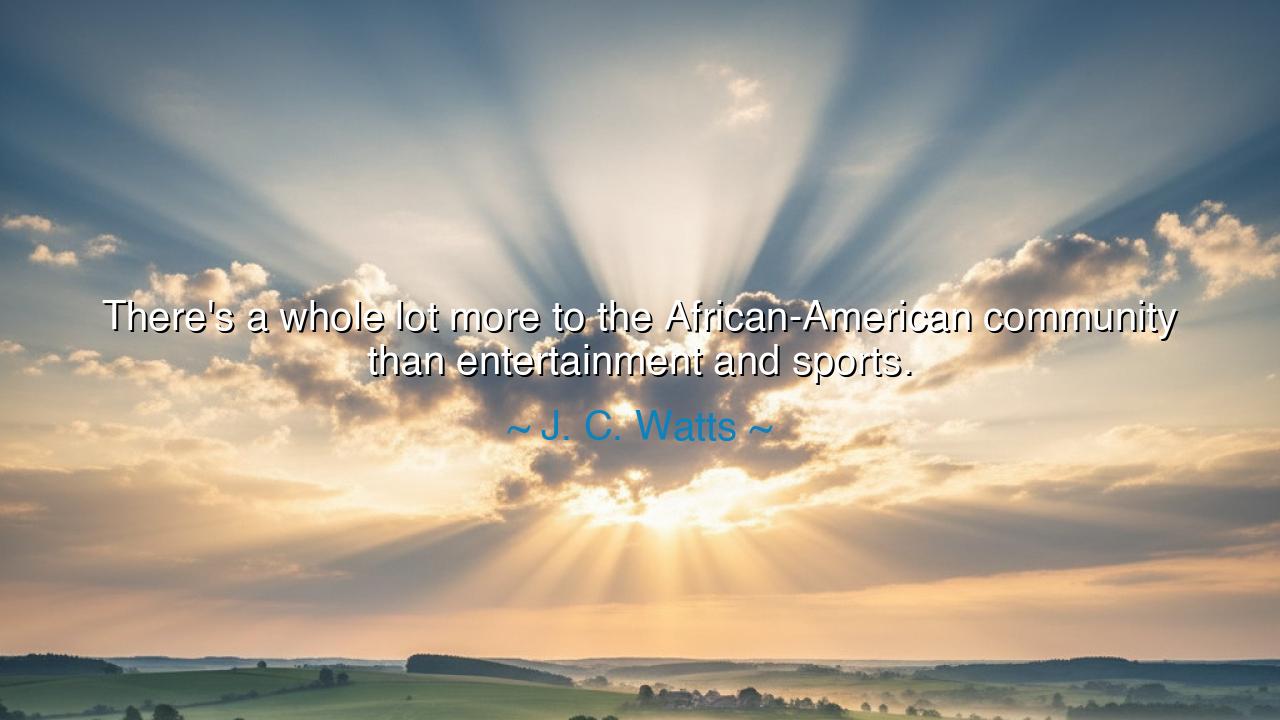
There's a whole lot more to the African-American community than
There's a whole lot more to the African-American community than entertainment and sports.






The words of J. C. Watts, “There’s a whole lot more to the African-American community than entertainment and sports,” resound like a trumpet call to truth. They strike at the heart of a narrow vision that the world has too often imposed, a vision that seeks to limit greatness to the stage and the arena, as though the spirit of a people could be confined to performance alone. In this statement lies a profound declaration: that the African-American community is not a shadow cast by stereotypes, but a vast constellation of genius, resilience, leadership, invention, and faith.
The origin of this saying lies in centuries of struggle. Too often, society chose to celebrate Black bodies when they ran fast or sang sweetly, while ignoring their voices in halls of power, their pens in the books of law, their hands in the building of cities. Watts, himself a man who rose in leadership, sought to break this illusion, to remind the world that African-Americans have shaped history not merely by entertaining, but by envisioning, creating, and leading. His words reclaim the dignity of an entire people and declare their boundless contributions.
Consider the story of Frederick Douglass, born into chains, yet rising not as a singer or athlete, but as an orator, a statesman, and a writer who shook the conscience of a nation. His pen was his weapon, his voice a sword that cut through the hypocrisy of slavery. Or think of George Washington Carver, who through science and invention transformed agriculture, teaching the land to yield sustenance for generations. These names remind us that the African-American story is woven through every field of human endeavor—politics, science, medicine, literature, and faith—not merely the lights of stadiums and stages.
The pattern of history shows us how oppression often sought to limit horizons. In Rome, gladiators were celebrated, but rarely were they heard as philosophers or senators. So too in America, for generations, Black talent was cheered when it entertained, but often silenced when it sought to govern or innovate. Yet the truth, as Watts declares, is that the fullness of a people cannot be confined. For the human spirit, once awakened, insists on expression in every field, breaking every chain of expectation.
The lesson is clear: do not accept the labels the world gives you, nor allow them to confine your destiny. If society says you belong only in the theater or the arena, know that your mind may belong in the laboratory, your vision in the halls of government, your wisdom in the shaping of communities. And if the world celebrates only a fragment of your people, rise to show the whole. For greatness is not the privilege of a few, nor the possession of one craft—it is the birthright of every soul that strives with courage.
Practically, this means uplifting and supporting Black excellence in every sphere. Celebrate the engineer as much as the musician, the teacher as much as the athlete, the entrepreneur as much as the actor. Encourage children not only to dream of championships, but also of building businesses, leading nations, and healing bodies. Just as Watts spoke truth to a nation, so must each of us speak and act to ensure that opportunity is not narrowed, but expanded.
So, beloved listener, take this wisdom into your heart. Entertainment and sports are noble pursuits, but they are only branches of a greater tree whose roots sink deep into the soil of history and whose branches stretch into every sky. The African-American community, like all humanity, is infinite in its gifts. Honor that infinity. Encourage it. And in doing so, you will not only break the chains of stereotype but also help to reveal the fullness of human possibility. For in truth, as Watts reminds us, a people is never one thing—they are many, and in their many, they are great.






AAdministratorAdministrator
Welcome, honored guests. Please leave a comment, we will respond soon